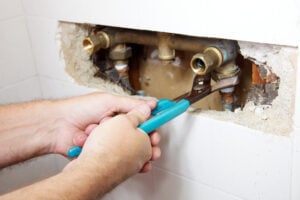
Clean, sweet water is what we want from our water pipes every time we open a faucet. Most of the time, that’s what we get. But did you know that you could have contaminants lurking in your own plumbing system? There are several unwanted substances that can grow or accumulate in household pipes and fixtures. Knowing what could be present is the key to learning how to eliminate each one.
With a little investigation and the help of a good plumber, you can find out if any of the following contaminants are present:
- Built-Up Minerals and Sediment: In areas with hard water like ours, minerals like calcium and magnesium tend to accumulate inside your pipes. These mineral deposits can become so thick that they restrict water flow, reduce water pressure, and shorten the lifespan of plumbing fixtures and appliances. In severe cases, pipes can become nearly blocked, requiring costly repairs or replacements.
In older homes, sediment can also collect at low points in the plumbing system. This gritty debris settles in your pipes and water heater. It is also capable of damaging plumbing as well as affecting the taste and quality of your water.
- Corrosion and Rust: If your home has galvanized steel or cast iron pipes, corrosion can be a serious concern. Aging pipes can corrode from the inside out. The galvanized coating on steel is supposed to protect the pipes from acidic water, but the zinc coating can dissolve, leaving the steel pipe susceptible to corrosion. Rust flakes may break off and enter your water supply, discoloring your water with a brown or reddish tint. The damage can become so severe that the pipes eventually leak or burst. The rust in your water can also stain laundry, damage appliances, and clog faucets or shower heads.
- Bacteria and Biofilm: Moist, enclosed environments like pipes are preferred breeding grounds for bacteria. Biofilm—a slimy, sticky substance made up of microorganisms—can develop in wells and within your household plumbing. These films cling to the inner surfaces of pipes or other parts of your system. While most bacteria in household plumbing are harmless, some can cause unpleasant odors, strange tastes, or even health risks for individuals with weakened immune systems.
Water smelling like rotten eggs points at sulfur-reducing bacteria in your pipes or water heater. In rare cases, pathogens like Legionella (the bacteria that cause Legionnaires’ disease) can also develop in poorly maintained systems. A disinfection of the whole plumbing system must be done to remove these bacteria.
- Chemical Residue: Industrial chemicals, pesticides, or cleaning agents that were flushed down your drain can leave traces in your pipes. Any area where the water doesn’t move very often can be a reservoir of these chemicals. As examples, faucets in a part of the house that are not used, or sections of pipe that don’t lead anywhere at the moment. Any place where water is stagnant can store these chemicals. Contaminated water lines should be identified and corrected by a licensed plumber to prevent long-term exposure.
- Debris from Plumbing Work or Construction: Repairs or construction done near your plumbing can add soldering material, plastic shavings, joint compound, or metal fragments to your plumbing system. These materials can cause clogs, contribute to biofilm growth, or interfere with the smooth operation of valves and faucets. Even brand-new pipes should be flushed to eliminate any manufacturing residue before they are put into operation.
Professional Plumbers Know How to Deal with These Problems
Plumbing companies today have access to advanced tools like in-pipe video cameras, water pressure gauges, and chemical tests to diagnose hidden issues like these. A plumber can inspect your system for corrosion, biofilm, sediment, or other buildup, then recommend the right solutions. It might be something as simple as filtration or flushing the system. In severe cases, pipe replacement might be required.
If you’ve noticed strange smells, discoloration, inconsistent water pressure, or an increase in your water bill, don’t wait. These are indications that something is not right in your system. Plumbing problems don’t generally go away on their own! In the Greater Albuquerque area, call Rocketman Plumbing for fast, accurate service!
